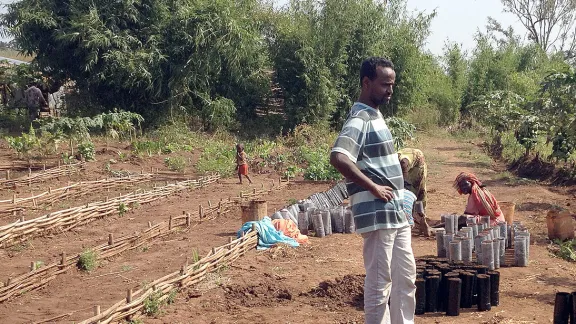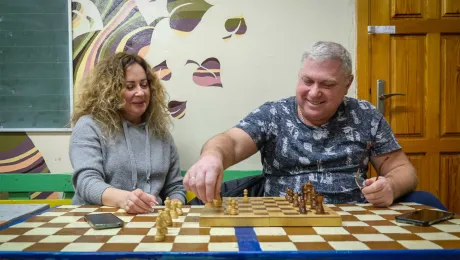
Teaching refugees to protect the earth not only results in a more pleasant camp environment, it enables participants to acquire skills that will last a lifetime, says LWF World Service in Ethiopia’s Tesfahun Abrham.
I have seen my share of suffering. I grew up in Asosa town, western Ethiopia, and as a child I saw flocks of destitute people forced out of their homes during the 1985 drought that hit most of our country. It was a heartbreaking sight.
A few years later, I witnessed Sudanese people seeking refuge across the border due to war in their home country and living in Tsore camp. I saw the devastation in their faces. That stayed with me through adulthood and I think it influenced me, for the most part, to help those in need. My career inclined towards humanitarian assistance.
I worked at the agricultural and rural development office in rural Asosa before joining the Lutheran World Federation. I did what I could to those in need and I came to understand the role of individuals, as well as communities, in difficult conditions. I have now been working as environmental protection and livelihood officer for over three years at LWF World Service in Ethiopia.
I believe harm to the natural environment should be avoided as much as possible during humanitarian assistance. Apart from the concern about protection of the environment, proper utilization of resources is highly important for sustainable livelihoods. Hence, the issue becomes important for saving lives.
Bambasi refugee camp, 100km from Ethiopia's border with Sudan, had little vegetation and is established in an area that is prone to erosion. In addition to this, the camp settlement is densely populated, aggravating the problem of environmental degradation. At the LWF, we have a training package that supplements both sustainable livelihoods for refugees and the problem of environmental degradation. I am proudly part of this project.
Through environmental education and awareness, planting and tending seedlings and carrying out soil and water conservation activities, the camp has seen a radical change with improved vegetation cover, rehabilitation of degraded areas and increased aesthetic view of the camp and its vicinity. More importantly, the livelihood of the refugees is improving because the fruit trees have started yielding fruit, creating employment opportunities as well as supplementing their diet. Refugees have acquired skills they can make use of in the future.
Although it takes longer to achieve these results and it comes with its own challenges, I am happy I get to move around the camp and see that refugees have fruit and vegetables growing in their compounds. I am glad to take shelter from the sun under the trees I help plant. I rejoice knowing that people will enjoy the fruits of their labor in the years to come and that the land is becoming greener than ever.
I have learned that in refugee assistance, there is a cost to the environment because more often it leads to natural resource and environmental degradation. I have also learned that integrating the issue of environment into refugee assistance not only has short term benefits but in the long run creates a cleaner and safer living space as well.
It gives me pleasure to know that I have helped vulnerable people and that I have contributed to the protection of the environment.
From those I have met in the course of my humanitarian work, Mohammed lingers on my mind. He was among many refugees I trained and employed. He set up a small shop in front of his tukul (house) by saving the income he got from the employment opportunity created for him. He has now obtained urban refugee status and moved away.
Most of the refugees of the camp freely discuss various personal issues with me. I like being part of their lives in ways I have not imagined before. Moreover, I also get great pleasure when my colleagues assist me and give feedback on my services. Above all, I am delighted and joyful about the respect I have from the refugees. I hope to continue serving the people and serving the environment.
Tesfahun Abrham is an environmental officer at Bambasi camp, western Ethiopia, where he implements the environment and livelihood project. This project is supported by LWF member Canadian Lutheran World Relief.


